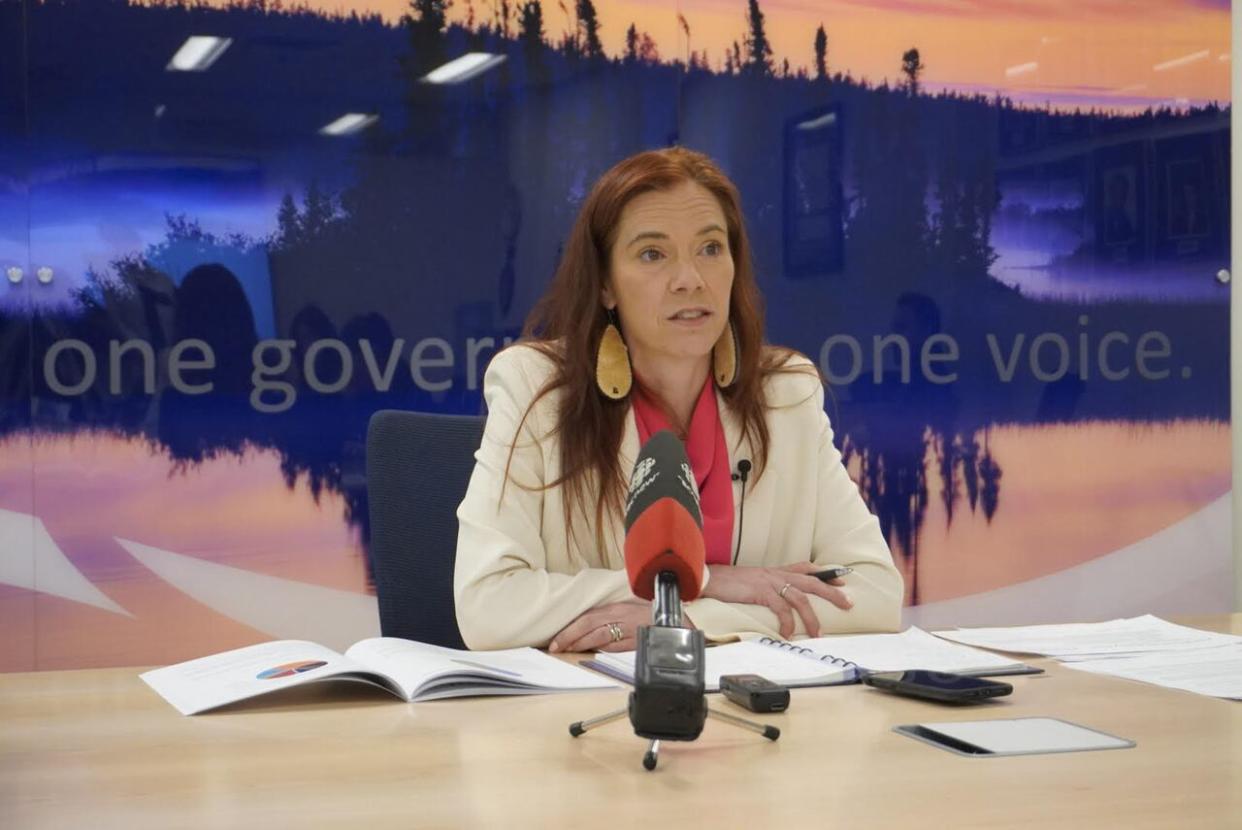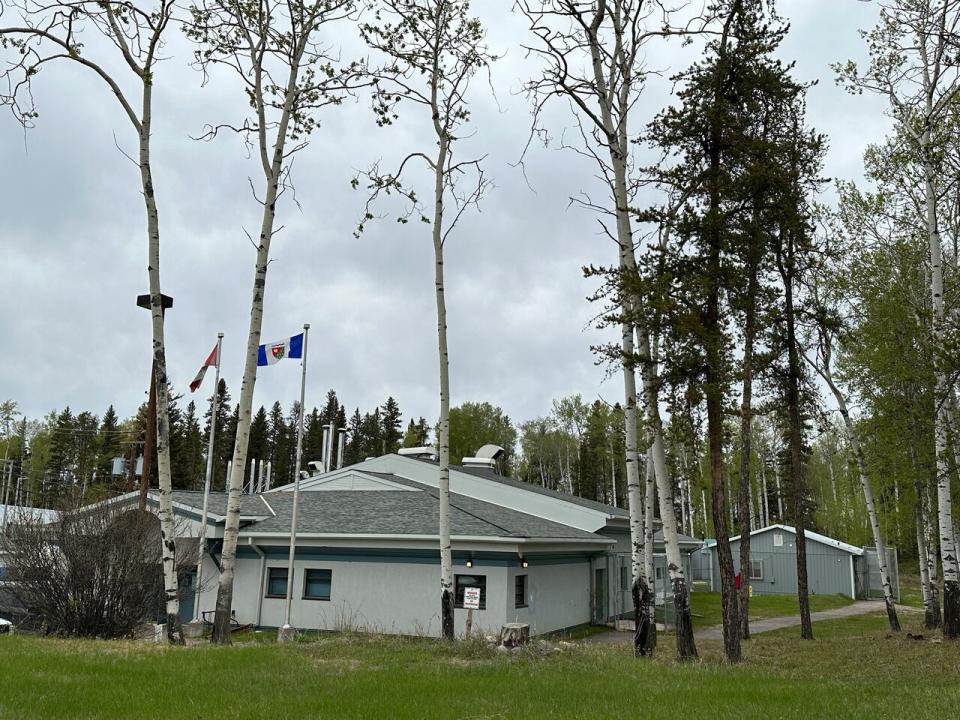N.W.T. budget suggests job cuts, partial jail closure to save money and prepare for the unexpected

Job cuts and a partial closure of the Fort Smith jail are some of the measures the N.W.T. government wants to take in order to help the territory manage the costs of unexpected events like evacuations, wildfires and floods and pay down debt.
On Friday morning, Finance Minister Caroline Wawzonek tabled the 2024-25 operating budget. She characterized the $2.2-billion plan as one that includes "difficult choices" to ensure the territory is financially ready for whatever the future might bring.
The plan boasts about $24 million more in spending than last year's and proposes freeing up $100 million — $48 million through spending cuts and $52 million through increased revenues. That's $50 million short of the government's goal announced in February to reduce short-term debt by $150 million by the end of this assembly.
"We're not making cuts for simply the sake of making cuts," Wawzonek told reporters Friday morning before tabling the budget.
Overall, the budget suggests reducing 91 public service positions, 33 of which are currently vacant. That leaves 58 jobs that are currently staffed included in the proposed cuts.
The government has not identified which positions will be cut, though it says 69 of the 91 total positions are under the Union of Northern Workers (UNW).
The budget documents indicate the reductions will be made possible through consolidation of programs, bringing them under one department with one point of contact for residents.
The plan also proposes $2.7 million in savings in closing the Fort Smith Correctional Facility's men's unit. The government is looking into repurposing the facility as a wellness centre to make use of an existing building and staff.

Fort Smith Correctional Complex. Budget documents indicate a savings of $2.7 million in closing the facility's men's unit. Finance Minister Caroline Wawzonek says she hopes to use the building and its trained staff for a wellness centre. (Julie Beaver/CBC)
Wawzonek said she doesn't yet know what a wellness facility would include and whether a treatment facility is part of that.
"I don't have a nice little bow on top of this one," she said.
To prepare for 'shocks'
Wawzonek said the budget is all about improving the territory's capacity to deal with expenditure shocks — like a global pandemic and historic climate disasters.
The plan sets aside about $22 million for fire suppression activities, an amount previously calculated from historical averages. The 2023 wildfire season cost the Northwest Territories about $150 million in fire suppression alone, not including evacuation costs, financial assistance and other costs.
Wawzonek said she didn't propose a set sum for wildfires in case more money is needed for floods or some other unforeseen emergency.
"I think the idea here of being sustainable and having a sustainable budget is not trying to, you know, shake the Magic 8 ball and know exactly which disaster challenge or emergency might befall us," she said.

Smoke billows from a wildfire along N.W.T. Highway 1 in May 2024. (Robert Holden/CBC)
Other savings will come from discontinuing a midwifery expansion program in Yellowknife to free up $990,000, saving $1.6 million in office leases and reducing government printing costs by $300,000.
Some of those suggestions are the results of feedback from public service workers themselves. Earlier this year, the territory opened an online survey asking for feedback on ways the government could save or earn more money. In the legislature Thursday, the premier said there were over 900 submissions.
Money (expectedly) coming in
To account for the projected growth in revenue, the territory is pointing to higher contributions from the federal government to the Non-Insured Health Insurance Benefits (NIHB) program and a return of money invested in community projects that never came to fruition.
There is one new tax coming in this year — a vaping tax — though it's only expected to generate about $252,000. A levy on 9-1-1 users is also increasing from $1.70 a month to $3 a month. That is projected to raise approximately $700,000.
In aiming for a kind of fiscal safety net for the future, the budget proposes a $294 million surplus. Those funds will be put toward capital projects and also be used to pay down $49 million of the territory's debt. The N.W.T.'s debt is forecast to stand at $1.6 billion by March of 2025, $184 million below the federally imposed borrowing limit.
With the impending closure of Diavik Diamond Mine and a labour force based heavily in public service, Wawzonek acknowledged the familiar push to diversify the territory's economy.
"I don't even want to venture a guess as to how many budgets and how many years and how many assembly cycles there's been efforts to sort of 'force diversification of the economy from government to the private sector,'" she said.
Wawzonek said it's up to the private sector to diversify the private sector, but pointed to a few areas she said are poised to bring money into the territory.
Resource extraction could still be a major player in the territory's economy, she said, with projects like Nechalacho, Pine Point and NICO advancing.

An aerial view of the Nechalacho mine site in near Yellowknife. (Bill Braden/Vital Metals)
Commercial fishing, she said, had a big year and she said she hopes it will continue to grow.
A new fish processing plant has been planned to open in Hay River for years — first slated to open in 2020 but still without an opening date.
She pointed further to hopes for growth in tourism and the film industry, which is receiving $529,000 for a film and media strategy.
While the plan suggests removing government jobs for savings, salaries themselves are currently under negotiation.
The government of the Northwest Territories and the UNW are currently negotiating a new collective agreement. That negotiation has moved into mediation because the parties' positions were too far apart.
In the coming weeks, MLAs will discuss the proposed budget and vote before the end of the spring session on June 13.


